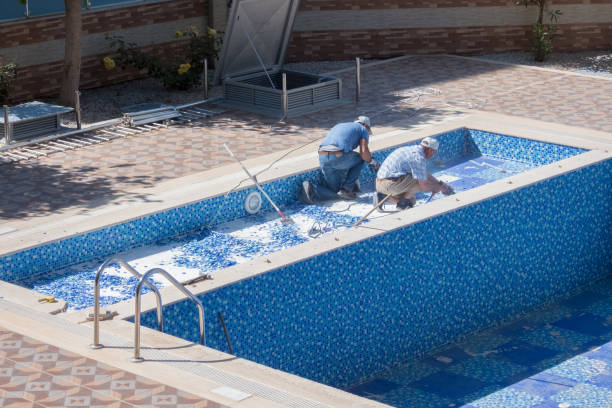Swimming pools offer a perfect retreat during hot days, but they require consistent care to ensure safety, hygiene, and long-term functionality. Whether you are a new pool owner or looking to refine your maintenance routine, this comprehensive guide will help you master the essentials of swimming pool maintenance in Henderson NV.
Why Is Pool Maintenance Important?
Proper pool maintenance ensures:
- Clean and safe swimming conditions.
- Longevity of the pool structure and equipment.
- Prevention of costly repairs.
Neglecting routine care can lead to water contamination, algae growth, or damage to the pool’s surfaces and systems.
Essential Pool Maintenance Tools
To maintain your swimming pool effectively, you’ll need:
- Skimmer Nets: For removing debris like leaves and insects.
- Pool Vacuum: Keeps the bottom free of dirt and sediment.
- Brushes: Scrub walls and tiles to prevent algae buildup.
- Water Test Kits: Monitor chemical levels like chlorine, pH, and alkalinity.
- Pump and Filters: Essential for water circulation and cleanliness.
Daily Pool Maintenance Tasks
Consistency is key. A few daily actions can go a long way:
- Skim the Surface: Remove floating debris.
- Check Water Level: Ensure the pool stays filled to the ideal level.
- Inspect Equipment: Verify the pump and filter are working efficiently.
Weekly Pool Maintenance Routine
Dedicate time each week to:
- Vacuuming: Use a pool vacuum to remove debris from the bottom.
- Scrubbing Walls: Prevent algae by brushing the walls and floor.
- Testing Chemical Levels: Adjust pH (7.2–7.8) and chlorine levels (1–3 ppm).
- Cleaning Filters: Backwash sand or DE filters, and rinse cartridge filters.
Monthly Pool Maintenance Checklist
Monthly tasks ensure in-depth care:
- Inspect Pool Equipment: Check for wear and tear in pumps, heaters, or filters.
- Shock the Pool: Superchlorinate to kill bacteria and algae.
- Check for Leaks: Look for unexplained water loss or structural cracks.
Seasonal Pool Maintenance Tips
Summer:
- Increase chlorine usage due to higher swimmer activity.
- Run the pump for at least 8–12 hours a day to circulate water.
Winter:
- Winterize your pool by covering it and lowering water levels.
- Add algaecide to prevent growth during the off-season.
Common Pool Problems and Solutions
- Cloudy Water: Often caused by imbalanced chemicals. Test and adjust pH, alkalinity, and chlorine levels.
- Algae Growth: Shock the pool and brush affected areas.
- Stains on Walls: Use stain removers specific to the material of your pool.
Professional Pool Maintenance Services
For busy schedules or complex issues, professional pool services can handle:
- Equipment repairs.
- Seasonal openings and closings.
- Advanced water chemistry treatments.
Eco-Friendly Pool Maintenance Options
- Use energy-efficient pumps to reduce electricity consumption.
- Opt for saltwater pools to minimize chemical use.
- Invest in solar pool covers to retain heat and reduce evaporation.
FAQs
Q1. How often should I test my pool water?
Testing should be done at least twice a week during peak swimming season and once weekly during cooler months.
Q2. How long should I run my pool pump each day?
Run your pump for 8–12 hours daily to ensure proper water circulation and filtration.
Q3. What’s the best way to prevent algae?
Regularly shock your pool, maintain proper chemical levels, and brush surfaces weekly.
Q4. How do I remove stains from my pool?
Identify the stain type (organic or metallic) and use a specialized stain remover. Regular scrubbing can also help office 365 consultant.
Q5. Can I use household bleach in my pool?
Household bleach can substitute for liquid chlorine but ensure it’s unscented and free of additives.
Summary
Maintaining a swimming pool requires effort and consistency, but with the right tools and knowledge, it becomes manageable. Follow these tips, and your pool will remain a safe, enjoyable space for years to come.
